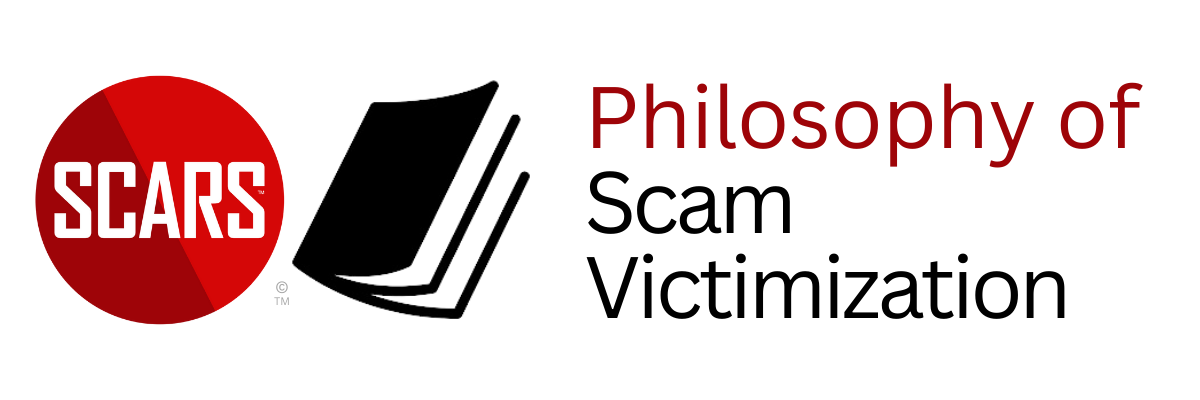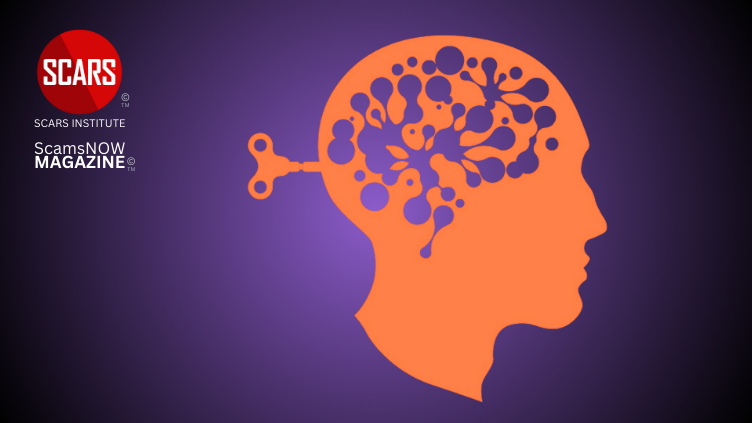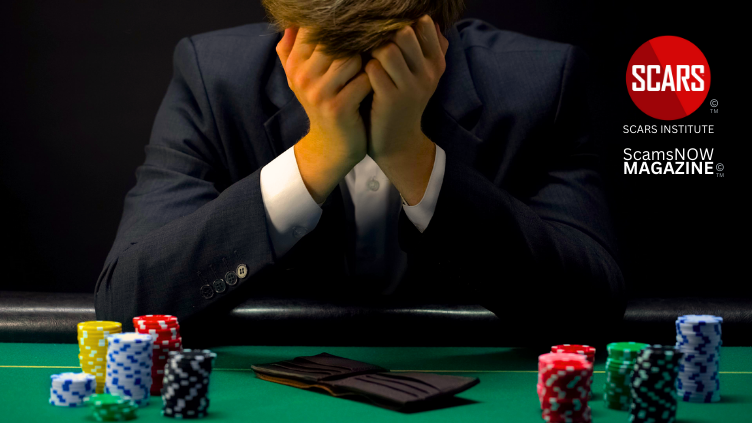A Philosophical Comparison Between Gambling and Scam Victims
Understanding Blaise Pascal’s work on probability and decision-making on Scam Victims by analyzing the gambler’s behavior through Pascal’s Wager
Primary Category: Scam Victim Recovery Psychology
Author:
• Tim McGuinness, Ph.D., DFin, MCPO, MAnth – Anthropologist, Scientist, Polymath, Director of the Society of Citizens Against Relationship Scams Inc.
About This Article
Blaise Pascal’s analysis of the gambler provides valuable insights into the psychology of scam victims.
Pascal observed that gamblers are driven by the hope of winning, even when logic dictates the risks outweigh the potential reward. Scam victims mirror this behavior, focusing on the promised benefits of a scam and ignoring warning signs.
Cognitive biases such as optimism bias, the sunk cost fallacy, and confirmation bias reinforce this behavior. Both gamblers and scam victims rely on emotional impulses over rational thought, making it difficult to break free from destructive cycles of hope and risk.

SCARS Institute Note:
Part of our mission is to fully understand and document the scam victim experience and to share that knowledge. We look at new topics for analysis and exploration almost every day. Some of this knowledge is intended for victims themselves, some for family and friends to help them better understand what the victims went through and why, and some for professionals who may help victims so they can more fully understand what happened and why. Some topics will be hard for scam victims to hear and understand or accept. Just keep in mind this is all to help the world better understand the scam victims’ experience so they can be better helped.
Philosopher Blaise Pascal’s Analysis of the Gambler and its Application to Scam Victims
Introduction
Blaise Pascal, in his work on probability and decision-making, famously analyzed the gambler’s behavior through Pascal’s Wager. His analysis suggests that humans often make irrational decisions based on hope, risk, and reward, even when logic indicates otherwise. Gamblers, driven by hope and the allure of winning, ignore the unfavorable odds and risk significant loss.
This pattern applies to scam victims, who may fall prey to fraudulent schemes due to the enticing promises of financial gain or emotional satisfaction. Similar to gamblers, scam victims often focus on the potential reward, overlooking the warning signs and high risks involved. The emotional and cognitive biases at play, such as hope for easy success or fear of missing out, push individuals to make decisions against their better judgment.
Pascal’s insights help explain why scam victims, like gamblers, continue to invest in a losing proposition, hoping that persistence will lead to a reward. This attachment to the promise of gain—even in the face of likely loss—creates a cycle of denial and poor decision-making, leading to greater harm and financial or emotional devastation.
Analysis of the Gambler and Its Application to Scam Victims
Blaise Pascal, a 17th-century mathematician and philosopher, is well-known for his work on decision theory, most famously illustrated through Pascal’s Wager. His analysis of the gambler’s mentality highlights the irrationality of humans when faced with uncertain outcomes, particularly in high-risk, high-reward situations. This concept applies to scam victims, who, like gamblers, are often driven by emotional responses such as hope and fear of missing out, causing them to disregard the logical risks involved in a fraudulent offer.
Risk and Reward: The Emotional Lure
Pascal’s analysis reveals how gamblers are often drawn to risk because of the potential reward, even when the likelihood of success is minimal. The same logic applies to scam victims, who may be promised quick financial gain, emotional satisfaction, or other life improvements. The promise of reward becomes so enticing that the perceived risk feels outweighed, leading them to invest time, money, or trust in the scam. In these situations, the emotional allure of winning overrides their ability to assess the actual odds of success, just as it does with gamblers.
This risk-reward imbalance creates a psychological trap. High-risk, high-reward propositions, especially those that promise easy or quick success, exploit the brain’s natural drive for reward, leading victims to overlook or minimize the risk involved. This dynamic is heightened when scammers create a sense of urgency, making it seem as though the opportunity could disappear if not acted upon quickly.
Hope and the Role of Emotion
Pascal’s exploration of the gambler shows that hope plays a significant role in decision-making, even when rational thought suggests otherwise. Scam victims are similarly driven by hope—hope for financial stability, a new relationship, or a life-changing opportunity. This hope blinds them to the warning signs that might otherwise raise alarm.
Hope activates the dopaminergic system in the brain, which is responsible for reward-seeking behavior. When scam victims are presented with an enticing opportunity, their brains release dopamine, the neurotransmitter associated with pleasure and reward, which motivates them to pursue the reward even if the logical part of their brain is aware of the risks. This neural activity creates an emotional attachment to the promise of success, making it difficult for victims to disengage from the scam, even as doubts begin to surface.
Cognitive Biases at Play
Several cognitive biases play a role in why scam victims allow themselves to fall prey to fraud, echoing Pascal’s analysis of the gambler:
Optimism Bias: Scam victims, like gamblers, tend to overestimate the likelihood of a positive outcome. Despite low odds, they convince themselves that they will be among the few who succeed, thus ignoring the true risks involved.
Confirmation Bias: Once a scam victim begins to engage with a fraudulent scheme, they often seek out information that confirms their belief in its legitimacy while dismissing evidence that contradicts it. This bias reinforces their hope and emotional investment.
Sunk Cost Fallacy: As scam victims invest time, money, or emotional energy into a scam, they may feel compelled to continue, believing that stopping would make their previous efforts a waste. This mirrors the gambler’s tendency to continue playing in hopes of recovering losses, even as the odds of success diminish.
Anchoring: When victims first encounter a scam, they may focus on an initial piece of information (such as the promised reward) and fail to adjust their perspective even as new, contradictory information emerges. This anchoring bias keeps them focused on the possibility of a positive outcome.
Scarcity Effect/Scarcity Heuristic: Scammers often create a sense of urgency by suggesting that the opportunity is limited or that others are competing for the same reward. This taps into the scarcity bias, which makes victims fear missing out, pushing them to act impulsively without carefully considering the risks.
The Brain’s Reward System
Pascal’s analysis highlights the conflict between reason and emotion, which modern neuroscience supports. When scam victims are presented with an attractive offer, the brain’s reward pathways (the Striatum) become activated, particularly in the ventral striatum and prefrontal cortex, which are associated with decision-making and reward processing. The release of dopamine, as mentioned earlier, fuels the desire to pursue the scam. This reward-driven behavior often overpowers the prefrontal cortex’s ability to fully assess risk, leading victims to act emotionally rather than rationally.
This neurological dynamic is especially potent in scams because the promise of reward creates an anticipatory pleasure—the emotional high that comes from imagining success. Scam victims become mentally and emotionally invested in this future outcome, causing them to ignore the growing signs of deception. The same mechanisms are seen in gamblers, who become fixated on the possibility of a big win, allowing it to dictate their behavior even when losses pile up.
Other Activities
Other human activities that mirror the dynamic of hope, reward, and short-term happiness are:
Gambling
Similar to scams, gambling involves a constant pursuit of reward despite high risks, driven by the hope of winning big.
Gambling closely mirrors scams as it revolves around the allure of quick financial gain and the emotional high from risk. Gamblers, like scam victims, focus on the potential rewards, often overlooking the overwhelming odds against them. The dopamine-driven reward system keeps them coming back for the rush of winning, even when losses mount. This creates a cycle where hope trumps logic.
Day Trading
Stock market speculators often chase short-term gains, motivated by the potential for quick financial success.
In day trading, individuals seek short-term profits by making rapid trades on stocks or currencies. Similar to gambling, day traders are drawn by the hope of immediate financial gain. While it can lead to quick wins, it’s highly risky, with many traders ignoring the long-term consequences in pursuit of short-term rewards. The volatility of markets fuels this, driving traders to make emotionally charged decisions based on the hope that the next trade will be a big win.
Video Gaming and Loot Boxes
Many players engage in games or loot boxes for the thrill of potential rewards, even when the odds are low.
Video games, particularly those with loot boxes (randomized rewards), encourage players to chase after rare items or upgrades. This system mirrors gambling, as players spend money or in-game currency for a chance to obtain coveted rewards. The random nature of loot boxes creates a compelling reward loop that taps into the same hope-reward cycle, giving brief moments of happiness when a rare item is won.
Addictive Behaviors
Whether related to substance use, shopping, sex, or unhealthy eating, addictive behaviors often involve pursuing momentary pleasure or relief, despite the long-term consequences.
Addictions, whether to substances, shopping, or even food, involve seeking short-term relief or pleasure despite harmful long-term consequences. People engage in these behaviors to escape emotional distress, boredom, or stress. Dopamine release during these activities creates a powerful association between the act and the immediate satisfaction it provides, reinforcing the cycle of cravings and continued engagement in harmful habits.
Social Media Validation
Constantly seeking likes or positive feedback on social platforms gives short bursts of happiness but can create a cycle of dependency on external validation.
On platforms like Instagram, Facebook, or TikTok, individuals seek likes, comments, and shares as forms of social validation. This taps into the brain’s reward system, where external validation becomes a source of short-term happiness. The anticipation of approval can become addictive, prompting users to keep posting or engaging with content in search of more likes or praise. This constant pursuit of social approval mirrors the emotional highs and lows seen in gambling or scams, creating a dependency on fleeting rewards.
In these activities, emotional engagement with the prospect of immediate satisfaction often overrides rational judgment, similar to the dynamics seen in gambling or falling victim to scams.
Across these activities—gambling, day trading, video gaming, addiction, and social media use—the hope for immediate reward drives behavior. The brain’s dopamine system, responsible for pleasure and motivation, reinforces the craving for short-term gains, even when risks or negative consequences are clear. This hope-reward cycle can lead to irrational decision-making, emotional dependency, and potentially damaging consequences.
Pascal’s Wager and Its Application to Scam Victims
What is Pascal’s Wager
Pascal’s Wager is a philosophical argument presented by Blaise Pascal that addresses belief in God. Pascal suggests that, given the uncertainty of God’s existence, it is more rational to wager on God’s existence than against it. The reasoning is that if God exists and one believes, the reward is infinite (eternal life), whereas if God does not exist, the loss is minimal. On the other hand, if one does not believe that God exists, the punishment (eternal damnation) is infinite, while non-belief gains nothing if God does not exist.
Application to Scam Victims
Blaise Pascal’s Wager in the case of scams is nearly the same, suggesting that, given the uncertainty of a new stranger, it’s more rational to believe the stranger than not, but of course, we all now know that this is a fallacy, especially in the case of romance scams or cryptocurrency scams.
In these scams, victims often “wager” on the hope of gaining love, financial success, or both, despite risks and uncertainties. The emotional lure of a potential romantic relationship or lucrative investment is strong, much like the hope of eternal salvation in Pascal’s Wager. Victims ignore warning signs or rational doubts, investing time, money, or emotional energy into the scam with the belief that the potential reward is worth the risk, but of course, the risk is never worth it. Even as the evidence suggests the likelihood of loss, the promise of a significant gain (and massive psychological manipulation) keeps them engaged, just as Pascal’s Wager suggests it’s better to believe in God due to the possibility of infinite reward.
Of course, in Pascal’s Wager, there is a significant element of greed and blame focused on the gambler, whereas with scam victims it is completely not their fault.
This parallels how scam victims, despite minimal evidence, may feel the investment is justified because the promised outcomes seem too good to pass up and this is one of the lure elements of these scams. In both cases, the wager is based on emotional appeal and the potential for a great reward, but with serious risks if the choice turns out to be wrong.
Breaking the Cycle: Awareness and Prevention
Pascal’s analysis suggests that self-awareness and rational decision-making are critical to avoiding the trap of gambling—and by extension, falling for scams. Scam victims can benefit from learning about cognitive biases and how the brain’s reward system can cloud judgment. Recognizing the emotional forces at play, such as hope and the desire for reward, can help victims step back and assess situations more objectively.
Understanding these psychological and philosophical insights can empower scam victims to:
Slow Down: Instead of rushing into decisions driven by emotional excitement or urgency, scam victims should take time to evaluate the situation carefully.
Seek Outside Perspectives: By discussing opportunities with friends, family, or professionals, victims can gain external, more rational viewpoints that may help counteract their emotional bias.
Acknowledge Cognitive Biases: Recognizing how biases like optimism, confirmation, and the sunk cost fallacy may be influencing their decision-making can help victims disengage from scams before further damage occurs.
Summary
The Philosopher Blaise Pascal’s analysis of the gambler provides deep insight into the human tendency to make irrational decisions in the face of risk and reward. Scam victims, like gamblers, are often driven by hope and emotional impulses, which are reinforced by cognitive biases and the brain’s reward system. Understanding these psychological mechanisms can help individuals become more aware of their vulnerabilities and make more informed decisions, potentially preventing them from falling into the same traps that Pascal’s gamblers do.
-/ 30 /-
What do you think about this?
Please share your thoughts in a comment below!
A Note About Labeling!
We often use the term ‘scam victim’ in our articles, but this is a convenience to help those searching for information in search engines like Google. It is just a convenience and has no deeper meaning. If you have come through such an experience, YOU are a Survivor! It was not your fault. You are not alone! Axios!
Statement About Victim Blaming
SCARS Institute articles examine different aspects of the scam victim experience, as well as those who may have been secondary victims. This work focuses on understanding victimization through the science of victimology, including common psychological and behavioral responses. The purpose is to help victims and survivors understand why these crimes occurred, reduce shame and self-blame, strengthen recovery programs and victim opportunities, and lower the risk of future victimization.
At times, these discussions may sound uncomfortable, overwhelming, or may be mistaken for blame. They are not. Scam victims are never blamed. Our goal is to explain the mechanisms of deception and the human responses that scammers exploit, and the processes that occur after the scam ends, so victims can better understand what happened to them and why it felt convincing at the time, and what the path looks like going forward.
Articles that address the psychology, neurology, physiology, and other characteristics of scams and the victim experience recognize that all people share cognitive and emotional traits that can be manipulated under the right conditions. These characteristics are not flaws. They are normal human functions that criminals deliberately exploit. Victims typically have little awareness of these mechanisms while a scam is unfolding and a very limited ability to control them. Awareness often comes only after the harm has occurred.
By explaining these processes, these articles help victims make sense of their experiences, understand common post-scam reactions, and identify ways to protect themselves moving forward. This knowledge supports recovery by replacing confusion and self-blame with clarity, context, and self-compassion.
Additional educational material on these topics is available at ScamPsychology.org – ScamsNOW.com and other SCARS Institute websites.
-/ 30 /-
What do you think about this?
Please share your thoughts in a comment below!
TABLE OF CONTENTS
- Understanding Blaise Pascal’s work on probability and decision-making on Scam Victims by analyzing the gambler’s behavior through Pascal’s Wager
- About This Article
- SCARS Institute Note:
- Philosopher Blaise Pascal’s Analysis of the Gambler and its Application to Scam Victims
- Introduction
- Analysis of the Gambler and Its Application to Scam Victims
- Other Activities
- Pascal’s Wager and Its Application to Scam Victims
- Breaking the Cycle: Awareness and Prevention
- Summary
- A Note About Labeling!
CATEGORIES
![NavyLogo@4x-81[1] A Philosophical Comparison Between Gambling and Scam Victims - 2024](https://scamsnow.com/wp-content/uploads/2025/04/NavyLogo@4x-811.png)
ARTICLE META
Important Information for New Scam Victims
- Please visit www.ScamVictimsSupport.org – a SCARS Website for New Scam Victims & Sextortion Victims.
- SCARS Institute now offers its free, safe, and private Scam Survivor’s Support Community at www.SCARScommunity.org – this is not on a social media platform, it is our own safe & secure platform created by the SCARS Institute especially for scam victims & survivors.
- SCARS Institute now offers a free recovery learning program at www.SCARSeducation.org.
- Please visit www.ScamPsychology.org – to more fully understand the psychological concepts involved in scams and scam victim recovery.
If you are looking for local trauma counselors, please visit counseling.AgainstScams.org
If you need to speak with someone now, you can dial 988 or find phone numbers for crisis hotlines all around the world here: www.opencounseling.com/suicide-hotlines
Statement About Victim Blaming
Some of our articles discuss various aspects of victims. This is both about better understanding victims (the science of victimology) and their behaviors and psychology. This helps us to educate victims/survivors about why these crimes happened and not to blame themselves, better develop recovery programs, and help victims avoid scams in the future. At times, this may sound like blaming the victim, but it does not blame scam victims; we are simply explaining the hows and whys of the experience victims have.
These articles, about the Psychology of Scams or Victim Psychology – meaning that all humans have psychological or cognitive characteristics in common that can either be exploited or work against us – help us all to understand the unique challenges victims face before, during, and after scams, fraud, or cybercrimes. These sometimes talk about some of the vulnerabilities the scammers exploit. Victims rarely have control of them or are even aware of them, until something like a scam happens, and then they can learn how their mind works and how to overcome these mechanisms.
Articles like these help victims and others understand these processes and how to help prevent them from being exploited again or to help them recover more easily by understanding their post-scam behaviors. Learn more about the Psychology of Scams at www.ScamPsychology.org
SCARS INSTITUTE RESOURCES:
If You Have Been Victimized By A Scam Or Cybercrime
♦ If you are a victim of scams, go to www.ScamVictimsSupport.org for real knowledge and help
♦ SCARS Institute now offers its free, safe, and private Scam Survivor’s Support Community at www.SCARScommunity.org/register – this is not on a social media platform, it is our own safe & secure platform created by the SCARS Institute especially for scam victims & survivors.
♦ Enroll in SCARS Scam Survivor’s School now at www.SCARSeducation.org
♦ To report criminals, visit https://reporting.AgainstScams.org – we will NEVER give your data to money recovery companies like some do!
♦ Follow us and find our podcasts, webinars, and helpful videos on YouTube: https://www.youtube.com/@RomancescamsNowcom
♦ Learn about the Psychology of Scams at www.ScamPsychology.org
♦ Dig deeper into the reality of scams, fraud, and cybercrime at www.ScamsNOW.com and www.RomanceScamsNOW.com
♦ Scam Survivor’s Stories: www.ScamSurvivorStories.org
♦ For Scam Victim Advocates visit www.ScamVictimsAdvocates.org
♦ See more scammer photos on www.ScammerPhotos.com
You can also find the SCARS Institute’s knowledge and information on Facebook, Instagram, X, LinkedIn, and TruthSocial
Psychology Disclaimer:
All articles about psychology and the human brain on this website are for information & education only
The information provided in this and other SCARS articles are intended for educational and self-help purposes only and should not be construed as a substitute for professional therapy or counseling.
Note about Mindfulness: Mindfulness practices have the potential to create psychological distress for some individuals. Please consult a mental health professional or experienced meditation instructor for guidance should you encounter difficulties.
While any self-help techniques outlined herein may be beneficial for scam victims seeking to recover from their experience and move towards recovery, it is important to consult with a qualified mental health professional before initiating any course of action. Each individual’s experience and needs are unique, and what works for one person may not be suitable for another.
Additionally, any approach may not be appropriate for individuals with certain pre-existing mental health conditions or trauma histories. It is advisable to seek guidance from a licensed therapist or counselor who can provide personalized support, guidance, and treatment tailored to your specific needs.
If you are experiencing significant distress or emotional difficulties related to a scam or other traumatic event, please consult your doctor or mental health provider for appropriate care and support.
Also read our SCARS Institute Statement about Professional Care for Scam Victims – click here
If you are in crisis, feeling desperate, or in despair, please call 988 or your local crisis hotline – international numbers here.
More ScamsNOW.com Articles
A Question of Trust
At the SCARS Institute, we invite you to do your own research on the topics we speak about and publish. Our team investigates the subject being discussed, especially when it comes to understanding the scam victims-survivors’ experience. You can do Google searches, but in many cases, you will have to wade through scientific papers and studies. However, remember that biases and perspectives matter and influence the outcome. Regardless, we encourage you to explore these topics as thoroughly as you can for your own awareness.

























![scars-institute[1] A Philosophical Comparison Between Gambling and Scam Victims - 2024](https://scamsnow.com/wp-content/uploads/2025/04/scars-institute1.png)

![niprc1.png1_-150×1501-1[1] A Philosophical Comparison Between Gambling and Scam Victims - 2024](https://scamsnow.com/wp-content/uploads/2025/04/niprc1.png1_-150x1501-11.webp)